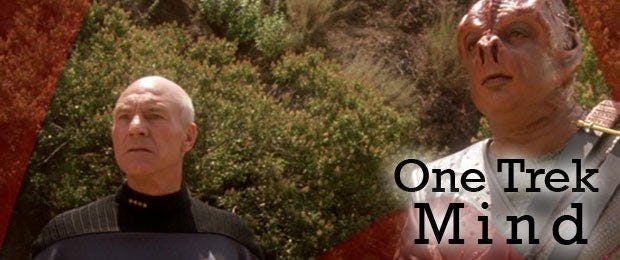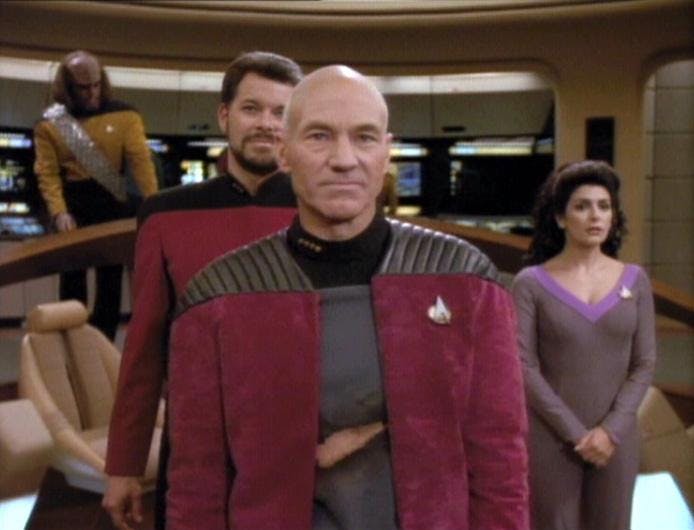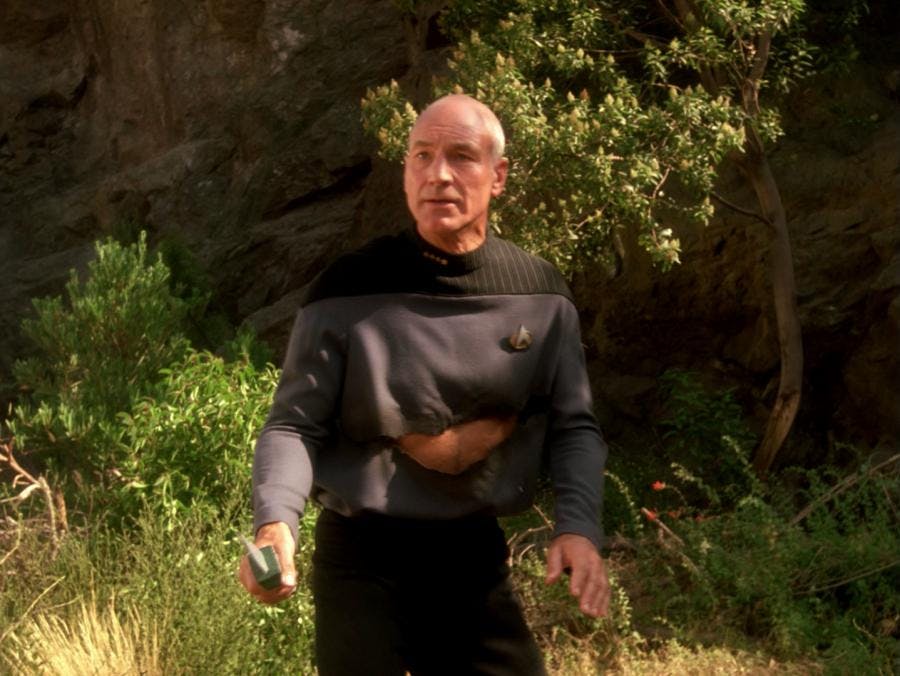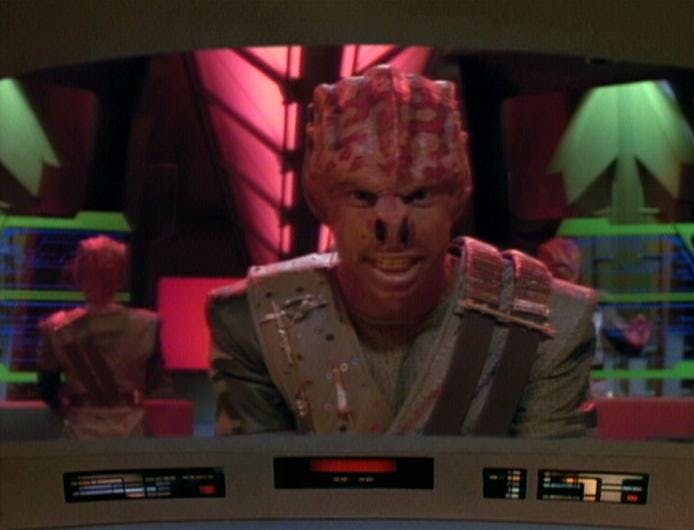Published Nov 20, 2013
One Trek Mind: Deciphering "Darmok"
One Trek Mind: Deciphering "Darmok"

Arguments about what is the best Star Trek episode can get heated and go on late into the night - I should know, I've been there. Moreover, I can be easily swayed. “The City on the Edge of Forever?” “The Inner Light?” “Mirror Mirror?” “Yesterday's Enterprise?” Yes, yes, yes! They're all the best episode. But when it comes time to discuss what is the most profound episode, I think I have a clear pick.
“Darmok,” from The Next Generation's fifth season, edges out some of the competition (like TOS' fiercely pacifist “Day of the Dove” or “A Taste of Armageddon”) with its odd specificity. In other words, a message about the futility of war isn't something you'll only get from Trek. But “Darmok”'s story about a group or an individual so determined to communicate with others that they are willing to sacrifice themselves to make that contact – that's something more unusual, even if it isn't any less universal.

“Darmok,” of course, is the episode where a Tamarian (also known as the Children of Tama) named Dathon realizes that great risks must be taken if his people are ever going to reach outside their own clan. Because of their unique fashion of speech which used metaphoric descriptions based on their own mythology, the universal translator is unable to make the usual connections. We'll eventually realize that “Shaka, when the walls fell” means “failure,” but with no reference to Shaka (or his wall-falling misfortune) the UT program is unable to do so.
But Dathon perseveres. Lucky for him he's going head-to-head with Captain Picard, a man with an almost fanatical devotion to understanding and learning. It reaches its climax when Picard, our most cultured of all Captains, engaged in conversation with a man who can't really understand him, but yearns for that outreach. He tells him a story – the first story – the Epic of Gilgamesh. Perfectly, the tale of Gilgamesh mirrors the current life-or-death struggles of our two poet-warriors on the dangerous planet of El-Adrel.

But this is even luckier for us. This is just the sort of thing Patrick Stewart can sink his teeth into in ways other actors wouldn't dare. His recounting of Gilgamesh's tale is some of his most basso profundo moments in all of TNG, but that ain't nothing compared to the big finale when Picard runs to the bridge, olive branch extended, to face forward and intone the now meaningful words “Darmok and Jalad at Tanagra” and “Darmok and Jalad on the ocean.”
Yet there's one annoying thing about “Darmok.” If the Tamarians only speak in these metaphors, how did they ever learn the words that later came to be used in the phrases? How did they know that walls fell around Shaka if they need a phrase to symbolize the word “wall?” Or, at the finish, when Dathon's first officer concludes “Picard and Dathon at El-Adrel,” how did they know the planet was called El-Ardel?

There are a few possible answers. The first one, as always, is “shut up!” (More so than usual, the choice to just suspend disbelief offers great pleasure – the cathartic final beat should swell up emotion in just about anyone, as success at communication is a very basic human trait.) The other suggestion I've heard is that the Tamarians speak with partial telepathy, and the verbal aspect is merely flourish – like an emotional tint that comes from inflection. Or it could just be that the instigating words are somehow just lost in the mists of time.
We do get a very quick peek at Dathon's log and its strange notation that appears to have graphs as well as glyphs. They look neat, but no amount of scrutiny will ever make them mean anything. Repeat viewings of “Darmok,” however, will give you a few key Tamarian phrases you can keep in your back pocket. Among them:
“Darmok and Jalad at Tanagra.” This most famous phrase (which appears on some hilarious T-shirts) means, basically, “working together.”
“Darmok and Jalad on the ocean.” Building on the last one, this is when two strangers, or foes, work together against a threat and succeed.
“The beast at Tanagra.” This is the foe that Darmok and Jalad fought, but has grown to represent any problem that needs to be solved. The lack of communication between Dathon and Picard is a “beast at Tanagra” of its own.
“Temba, his arms open.” This means “take or use this.” A gift.
“Temba, at rest.” When a gift has been rebuffed.
“Zinda, his face black, his eyes red.” Hearing this means bad news. Something one says when in great pain or very angry.
“Kiazi's children, their faces wet.” This also means pain, but also sadness or frustration. It may also mean “oh, leave me alone!”
“Shaka, when the walls fell.” Failure. I've decided to start saying this when anything doesn't go my way. Works just as well as “oy vey.”
“Mirab, with sails unfurled.” This means travel or departure.
“Uzani, his army with fists open.” A tactical move to lure your enemy closer by spreading out.
“Uzani, his army with fists closed.” A tactical move to close-in on an enemy after luring him in.
“The river Temarc, in winter.” Be quiet. Possibly based on “freeze,” as in “freeze your thoughts/mouth.”
“Sokath, his eyes open.” To translate this to TOS, this means “We Reach!”
I've left a few out. Frankly, I'm not sure I've nailed them all yet. However, my favorite one is “Picard and Dathon at El-Adrel.” It doesn't just mean two strangers come and make a connection. That's what “Darmok and Jalad at Tanagra” and “Darmok and Jalad on the ocean” mean. No, this one is something totally new. This one means “first contact.”
Did your first viewing of “Darmok” blow your mind like it did mine? If so, leave your metaphorical description below.
__________________
Jordan Hoffman is a writer, critic and lapsed filmmaker living in New York City. His work can also be seen on Film.com, ScreenCrush and Badass Digest. On his BLOG, Jordan has reviewed all 727 Trek episodes and films, most of the comics and some of the novels.
